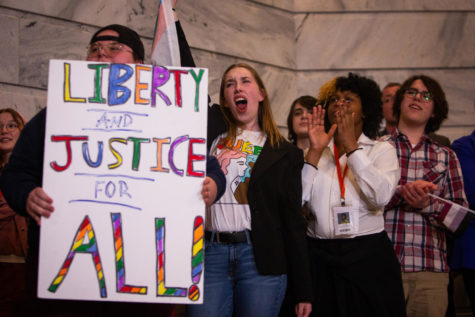On the question of trans rights, there is no neutrality
Rallyists hold up signs in opposition during the KY Fairness Rally on Feb. 15, 2023, at the Kentucky State Capitol in Frankfort, Kentucky. Photo by Samuel Colmar | Staff
March 27, 2023
Recent legislative sessions in Kentucky and other states have seen an alarming number of anti-LGBTQ bills advance toward becoming law.
This is the natural result of a climate of bigotry and hateful commentary that has been allowed to fester in public forums for some time.
The rights of trans people in particular are endangered by this legislative effort by the Republican Party, and it must be understood that there are only two possible stances on this matter: active support of trans rights or acceptance of their restriction.
The bills vary in the scope of their language and the exact targets specified, but they all pose a danger to the security of transgender individuals in every state where they are proposed.
The bills restricting drag performances generally classify any entertainment act that includes a gender presentation deviating from the performer’s gender assigned at birth as “adult performances” and thus inappropriate for children.
Kentucky’s Senate Bill 115 in particular would prohibit drag shows “on publicly owned property; or in a location where the person knows or should know that the adult performance could be viewed by a person under the age of eighteen (18) years.”
Under the bill, businesses hosting these shows may have their liquor licenses revoked should a minor be present at the show, and anyone performing in drag in the presence of minors can be criminally charged.
The definition for adult performances in this bill is expanded to include “a live performance, or a performance involving male or female impersonators, who provide entertainment that appeals to a prurient interest, regardless of whether or not performed for consideration.”
With a definition so broad, it is not hard to imagine that this law would provide a pretext for penalizing trans people for being visible in public where children might so much as lay eyes on them.
The more direct attack on trans rights comes in the form of bans on gender-affirming healthcare that are advancing in many states and are already law in some.
Kentucky’s version of this legislation may not be so severe as Oklahoma’s bill, which would criminalize all healthcare for trans minors and adults, but House Bill 470 in Kentucky would provide grounds for revoking the medical license and funding of any healthcare provider involved in the provision of gender-affirming care to a minor, including hormone blockers that forestall the onset of puberty.
While the pretext for this bill in particular is the prevention of harm to children who might be subject to surgery that they regret, the bill explicitly makes an exception in its definition of gender transition services that would allow surgeries performed on intersex minors — who have ambiguous sex characteristics — to continue.
The clear intention of this bill is to enforce conformity to gender expectations held by the bill’s sponsors and to further restrict the autonomy of transgender youth over their own bodies, as even those with affirming parents might be unable to access the care they need under this bill.

Also endangering trans youth is SB 150, which, as of March 16, has been sent to the governor’s desk. Dubbed a “parental rights” bill, it would bar school districts from keeping trans students’ identity confidential from parents, prohibit the requirement of personnel to respect students’ pronouns and restrict instruction related to human sexuality.
While there is language in the bill to excuse withholding information in the event of potential abuse, there can be no doubt that trans students will face a variety of indignities and mistreatment at the hands of transphobic adults in the event that this bill becomes law.
In the wake of this onslaught of legislative attacks, there has been an outpouring of support for trans people and many unambiguous condemnations of these bills.
Notably absent from these public statements is any announcement or indication from the University of Kentucky that it will stand by its trans students and the trans patients of UK Healthcare should the bills in the Kentucky legislature become law.
The closest the university has come to acknowledging the adversity faced by trans people is an email sent by the University president Eli Capilouto on Nov. 7, affirming the school’s commitment to defending free speech when Michael Knowles and Riley Gaines, two public figures with histories of inflammatory rhetoric directed at trans people, were hosted by the university within a week of each other last semester.
Knowles has more recently stated at the Conservative Political Action Conference on March 4 that “transgenderism must be eradicated from public life entirely,” and the student group that hosted Gaines on campus has recently been promoting the appearance of Charlie Kirk and Candace Owens, two more commentators with transphobic beliefs at a venue near campus.
It is nothing short of despicable that the most the university will do in response to the violent rhetoric of these commentators is to equivocate about the consequentiality of their words and presence, and its silence on the legislative assault on trans people of all ages in Kentucky is a shameful show of cowardice.
Words matter. A lack of words matters at least as much.
In the words of the late Rev. Desmond Tutu, “If you are neutral in situations of injustice, you have chosen the side of the oppressor. If an elephant has its foot on the tail of a mouse and you say that you are neutral, the mouse will not appreciate your neutrality.”
A university which claims to be inclusive must understand that tolerating intolerant beliefs ensures the destruction of inclusivity and that declining to protect its most vulnerable students because it would be politically inconvenient is not prudence.
































































































































































